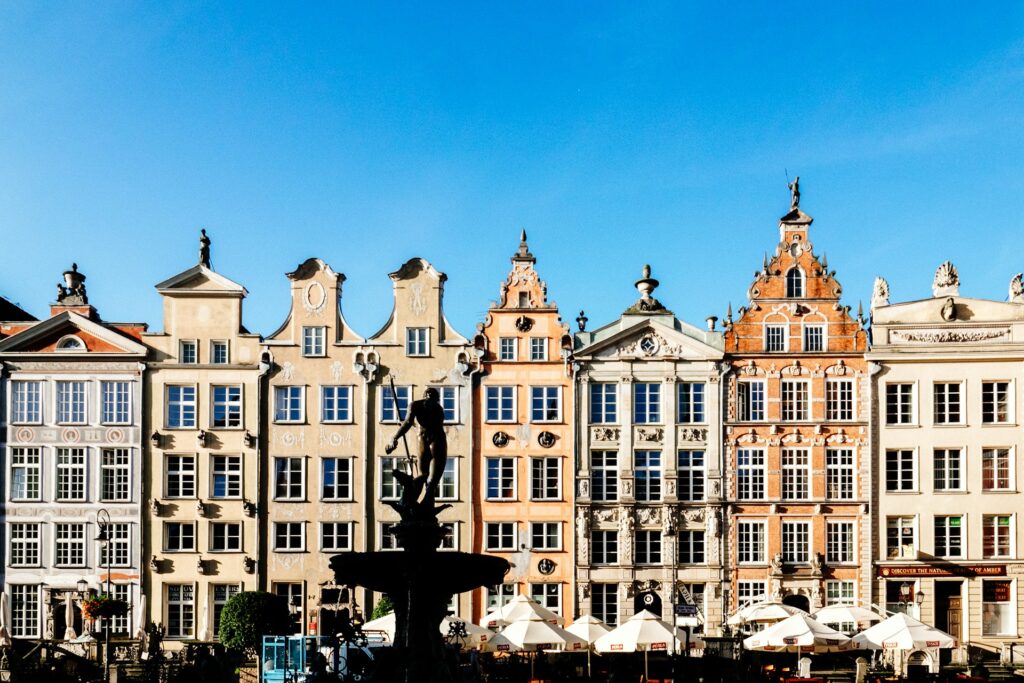Country
STUDY IN FINLAND

STUDY IN FINLAND
Finland’s world-leading higher education system offers more than 500 English-taught bachelor’s and master’s degree programmes in 13 universities and 22 universities of applied sciences (UAS). The universities also offer
English-taught doctoral degree options. Finnish higher education institutions have over 20 000 international students studying in several locations around Finland. All universities and universities of applied sciences have scholarship opportunities for international students.
FINLAND TOP UNIVERSITIES
A World-Class Education System
With one of best performing education systems in the
world, it’s no wonder over 14,000 international students have already chosen Finland for study abroad. Finland continues to eclipse the United States, the United Kingdom, Australia, and New Zealand in math, science and reading scores, and as of 2019, Finnish universities were ranked among the top 3 percent globally.
Affordable Tuition Fees
While tuition at Finnish universities is free for students from Finland and other EU countries, tuition fees for international students range anywhere from €6,000-€16,000 per year. However, there’s no shortage of funding opportunities for education in Finland.
Equality and Freedom
Equality and freedom are cornerstones of the Finnish
education system. In Finland, all students have equal opportunities to receive a high-quality education, and thanks to the flat hierarchy of Finnish universities, students are usually on a first-name basis with their professors. Academic freedom is also a core value in Finnish universities. Unlike the United States or the United Kingdom, students in Finland have the freedom to decide which modules they’d like to study, ensuring that each student graduates with a diverse body of skills and knowledge.
Job Opportunities for Students
Good news for career-minded students — most Finnish universities provide career services for international
students. They’re available to lend a hand during your job search, whether you’re looking for a student job, or a fulltime position for after you graduate.
QUICKFACTS
Academic YearAugust-July Living Cost €700–€900 per month In takes September and January
QUICKFACTS
Post Study Work Visa Up to 2 Years Part Time Work Upto 30 Hours per week Tuition Fees € 6,000 – 18,000 PA
Studying In the UK

Studying in the UK is an exciting opportunity, offering high-quality education, diverse cultural experiences, and a path to global career opportunities. With prestigious universities, innovative research programs, and a rich history, the UK continues to be a leading destination for international students. Here’s everything you need to know about studying in the UK:
1. Education System
The UK education system is well-structured and globally respected, with various levels of education available:
Degree Levels:
- Foundation Courses: 1 year (for students who don’t meet entry requirements for a full undergraduate degree).
- Bachelor’s Degree: 3 years (4 years in Scotland).
- Master’s Degree: 1 year.
- Ph.D.: 3-4 years.
Language of Instruction: Primarily English, though some universities in Wales and Scotland may offer Welsh or Gaelic programs.
Popular Fields of Study: Business, engineering, medicine, law, social sciences, humanities, creative arts, and computer science.
2. Top Universities
The UK is home to some of the world’s most prestigious universities:
- University of Oxford: One of the oldest and most renowned universities, known for its rigorous academic programs.
- University of Cambridge: Famous for its high academic standards and research excellence.
- Imperial College London: Well-known for its programs in science, engineering, and medical fields.
- London School of Economics (LSE): A world leader in economics, business, and social sciences.
- University College London (UCL): Known for its comprehensive programs across various fields.
- University of Edinburgh: Offers strong research programs and has a global reputation.
- University of Manchester: Known for diverse academic programs and research excellence.
3. Tuition Fees and Living Costs
The UK is generally considered expensive, but it offers great value for education and international exposure.
Tuition Fees:
- Undergraduate Programs: £10,000–38,000 per year (depending on the program and university).
- Master’s Programs: £11,000–40,000 per year.
- Ph.D.: £12,000–25,000 per year (for international students).
Cost of Living:
- Accommodation: £500–1,500 per month, depending on the city and type of accommodation.
- Living Expenses (food, transport, etc.): £800–1,200 per month.
- London: Typically more expensive compared to other cities.
4. Scholarships and Financial Aid
There are numerous scholarships available to help international students manage tuition fees and living expenses.
UK Government Scholarships:
- Chevening Scholarships: Fully funded scholarships for students pursuing a Master’s degree in the UK.
- Commonwealth Scholarships: For students from Commonwealth countries pursuing postgraduate study.
University Scholarships:
- Many UK universities offer merit-based scholarships, such as Oxford and Cambridge International Scholarships, UCL Global Scholarships, and University of Manchester Excellence Scholarships.
Private Scholarships:
- Numerous private organizations and charities offer scholarships, including the British Council and World Bank.
5. Admission Process
The admission process is straightforward, but deadlines and requirements vary by program.
- Choose a Program and University: Research UK universities and select the right program for you.
- Check Eligibility:
- For undergraduate programs, you typically need a high school diploma and may need to meet specific academic requirements.
- For graduate programs, you’ll need an undergraduate degree and might require a personal statement, letters of recommendation, and sometimes work experience.
- Apply:
- Undergraduate applications are submitted via UCAS, a centralized application system.
- Postgraduate applications are typically done directly through the university’s website.
- Submit Documents:
- For undergraduate courses, submit academic transcripts, proof of English proficiency (e.g., IELTS, TOEFL), and personal statements.
- For postgraduate courses, submit academic transcripts, references, a CV, and possibly a research proposal (depending on the program).
- Deadlines:
- Undergraduate: UCAS deadlines are typically in January (for most courses).
- Postgraduate: Varies by university, typically between October and March.
6. Student Visa
International students require a Tier 4 Student Visa to study in the UK.
- Requirements:
- Acceptance letter from a recognized university.
- Proof of financial support to cover tuition and living costs (around £1,334 per month if studying outside London, £1,523 in London).
- Proof of English language proficiency.
- Visa Fee: £348 (for students outside the UK).
- Processing Time: Typically 3 weeks.
- Work During Study: Students can work up to 20 hours per week during term time and full-time during breaks (depending on the type of visa).
7. Work Opportunities
The UK offers international students the chance to work during and after their studies.
Part-Time Jobs: Students can work up to 20 hours per week during term time and full-time during holidays.
Post-Study Work:
- The Graduate Route visa allows students who have completed a degree to stay and work for up to 2 years (3 years for Ph.D. graduates).
- You can work at any skill level and gain valuable work experience in the UK.
8. Language and Culture
Language: English is the primary language of instruction, and fluency in English is essential for successful studies. Some areas may also offer Welsh or Gaelic programs.
Cultural Diversity: The UK is known for its multicultural society, with students and professionals from all around the world. This diversity makes it a vibrant and welcoming place for international students.
Cultural Attractions: The UK offers rich cultural experiences, including historical sites, art galleries, museums, theater performances, and diverse culinary traditions.
9. Why Study in the UK?
- Top universities with global recognition.
- A diverse, multicultural environment.
- Opportunities for work experience during and after your studies.
- Strong focus on research and innovation.
- Vibrant student life and excellent extracurricular activities.
- Access to one of the world’s leading job markets.
Studying In the UK

Studying in the UK is a highly popular choice for international students, known for its rich history, world-class universities, and diverse cultural experiences. The UK offers a variety of academic programs, from undergraduate to postgraduate, with high-quality education that is recognized worldwide. Here’s everything you need to know about studying in the UK:
1. Education System
The UK has a strong and diverse education system with a long-standing tradition of academic excellence. It is home to many of the world’s top universities.
Degree Levels:
- Foundation Courses: 1 year (for students who don’t meet the entry requirements for a full undergraduate degree).
- Bachelor’s Degree: Typically 3 years (4 years in Scotland).
- Master’s Degree: Usually 1 year.
- Ph.D.: Typically 3-4 years.
Language of Instruction: English (in most universities; some universities in Wales and Scotland may offer Welsh or Gaelic programs).
Popular Fields of Study: Business, engineering, law, medicine, social sciences, humanities, creative arts, and computer science.
2. Top Universities
The UK boasts several prestigious universities, many of which are consistently ranked among the top universities globally.
- University of Oxford: One of the oldest and most prestigious universities in the world, known for its rigorous academic programs.
- University of Cambridge: Renowned for its history, research, and exceptional programs in sciences, humanities, and law.
- Imperial College London: Famous for its engineering, technology, and medical programs.
- London School of Economics and Political Science (LSE): Offers world-leading programs in economics, business, and social sciences.
- University College London (UCL): A comprehensive university known for its diverse academic programs.
- University of Edinburgh: Offers programs in a wide range of fields with strong international rankings.
- University of Manchester: Known for its research output and diverse course offerings.
3. Tuition Fees and Living Costs
The UK is considered relatively expensive, but the quality of education and global opportunities it offers make it a worthwhile investment.
- Tuition Fees:
- Undergraduate Programs: £10,000–38,000 per year (depending on the course and university).
- Postgraduate Programs: £11,000–40,000 per year.
- Ph.D.: £12,000–25,000 per year (for international students).
- Cost of Living:
- Accommodation: £500–1,500 per month, depending on location and type of accommodation.
- Other Living Expenses (food, transport, etc.): £800–1,200 per month.
- London tends to be more expensive compared to other cities, with living costs potentially higher than in smaller towns or cities.
4. Scholarships and Financial Aid
The UK offers a wide range of scholarships and financial aid programs to help international students afford their studies.
UK Government Scholarships:
- Chevening Scholarships: Fully funded scholarships for outstanding international students to pursue a Master’s degree.
- Commonwealth Scholarships: For students from Commonwealth countries to pursue postgraduate study in the UK.
University-Specific Scholarships:
- Many UK universities offer merit-based scholarships for international students, such as the Oxford and Cambridge International Scholarships, UCL Global Scholarships, and University of Manchester International Excellence Scholarship.
Private and Charitable Scholarships:
- Organizations like the British Council and various private foundations offer funding opportunities for international students.
5. Admission Process
The UK has a straightforward application process, but it can be competitive depending on the university and program.
- Choose a Program and University: Research universities and courses that align with your academic goals.
- Check Eligibility Requirements:
- High school diploma or equivalent (for undergraduate students).
- Proof of English proficiency (IELTS, TOEFL, or equivalent).
- Additional requirements may include a personal statement, CV, and letters of recommendation (for postgraduate students).
- Apply Online:
- Use the UCAS platform for undergraduate applications. Postgraduate applications are typically handled directly by the university.
- Submit Documents:
- Academic transcripts, proof of English proficiency, and other supporting documents.
- Deadlines:
- Undergraduate Programs: UCAS deadlines are usually in January (for most courses).
- Postgraduate Programs: Varies by university, but typically between October and March.
6. Student Visa
International students need a Student Visa (Tier 4) to study in the UK.
Requirements:
- A confirmed offer from a UK institution that is a registered sponsor.
- Proof of sufficient financial support to cover tuition fees and living costs (around £1,334 per month if studying outside London, £1,523 if studying in London).
- English language proficiency.
Visa Application Fee: £348 (for students outside the UK).
Processing Time: Around 3 weeks.
Work During Study:
- Students are generally allowed to work up to 20 hours per week during term time and full-time during holidays (depending on the type of visa).
7. Work Opportunities
The UK offers opportunities for international students to work during and after their studies.
Part-Time Jobs: Students can work part-time (up to 20 hours a week) during term time and full-time during holidays. Common part-time jobs include retail, hospitality, and tutoring.
Post-Study Work:
- The UK has recently introduced a Graduate Route visa, allowing international students who complete a degree in the UK to stay for 2 years to work at any skill level. Doctoral students can stay for 3 years.
8. Language and Culture
Language: English is the primary language of instruction, though you may encounter other languages like Welsh or Gaelic in certain areas.
Multicultural Society: The UK is home to people from diverse cultural backgrounds, making it a welcoming place for international students. You’ll experience a mix of cultures, traditions, and cuisines.
Cultural Attractions: From historical landmarks to modern art galleries, the UK offers a rich cultural experience. Cities like London, Edinburgh, Oxford, and Cambridge are filled with museums, theaters, music, and events.
9. Why Study in the UK?
- World-renowned universities and academic programs.
- A diverse and multicultural environment.
- Global recognition of UK degrees.
- Access to world-class research and innovation opportunities.
- Vibrant student life with a wide range of extracurricular activities and cultural experiences.
- Opportunities to stay and work in the UK after graduation.
Studying In the Canada

Studying in Canada is an excellent choice for international students who seek high-quality education, a multicultural environment, and post-graduation opportunities. Canada is home to some of the world’s top-ranked universities and offers a welcoming, safe, and diverse atmosphere for students from all around the world. Here’s everything you need to know about studying in Canada:
1. Education System
Canada has a reputation for offering a high standard of education with a focus on critical thinking, research, and innovation. The country’s education system is consistently ranked among the best in the world.
Degree Levels:
- Certificate/Diploma: 1–2 years (offered by colleges and technical schools).
- Bachelor’s Degree: 3–4 years.
- Master’s Degree: 1–2 years.
- Ph.D.: 3–5 years.
Language of Instruction: English and French (in some regions, particularly in Quebec).
Popular Fields of Study: Business, engineering, computer science, healthcare, social sciences, environmental studies, and education.
2. Top Universities
Canada has several prestigious universities that are well-regarded worldwide.
- University of Toronto: Ranked as one of the top universities in the world, known for its research and diverse programs in business, sciences, arts, and more.
- University of British Columbia (UBC): A global leader in research and innovation, offering strong programs in engineering, arts, and business.
- McGill University: Located in Montreal, McGill is known for its medical school, business programs, and high academic standards.
- University of Waterloo: Renowned for its engineering, computer science, and co-op programs.
- University of Alberta: Known for its strong programs in energy, engineering, and health sciences.
- McMaster University: Offers strong programs in health sciences, engineering, and business.
- University of Montreal: A major French-speaking university offering a wide range of programs.
3. Tuition Fees and Living Costs
Canada is generally more affordable than the US and UK, especially when compared to its high quality of education.
- Tuition Fees:
- Undergraduate Programs: CAD 7,000–29,000 per year (depends on the program and university).
- Master’s Programs: CAD 13,000–45,000 per year.
- Ph.D.: CAD 7,000–18,000 per year (varies by program and university).
- Cost of Living:
- Accommodation: CAD 400–1,500 per month (depending on the city and type of accommodation).
- Food and Miscellaneous Expenses: CAD 400–800 per month.
- Transportation: CAD 100–150 per month (public transportation).
4. Scholarships and Financial Aid
Canada offers a range of scholarships for international students to help reduce financial burdens.
Canadian Government Scholarships:
- Vanier Canada Graduate Scholarships: For doctoral students in all fields.
- Canadian Commonwealth Scholarship Program: For students from Commonwealth countries.
University-Specific Scholarships:
- Many Canadian universities offer merit-based scholarships, such as the University of Toronto International Scholar Award and UBC International Leader of Tomorrow Award.
Private Scholarships:
- Various organizations and businesses offer scholarships based on academic performance, need, or specific fields of study.
5. Admission Process
The admission process to Canadian universities is relatively straightforward, but requirements vary by program.
- Choose a Program and University: Research Canadian universities and select a program that fits your academic goals.
- Check Eligibility Requirements:
- High school diploma (for undergraduate students) or bachelor’s degree (for graduate students).
- Proof of English or French proficiency (TOEFL, IELTS, or TEF).
- Additional documents like letters of recommendation, a statement of purpose (SOP), and a resume (for postgraduate programs).
- Apply Online: Most universities allow online applications through their websites. You’ll need to pay the application fee (CAD 100–200).
- Submit Documents:
- Transcripts, proof of language proficiency, SOP, and any other supporting documents.
- Deadlines:
- Undergraduate Programs: Typically, applications are due by January–March.
- Graduate Programs: Deadlines vary, but generally 6–12 months before your program starts.
6. Student Visa
International students need a Study Permit (Student Visa) to study in Canada.
- Requirements:
- Letter of acceptance from a recognized Canadian institution.
- Proof of financial support (CAD 10,000 per year).
- Passport and other identification documents.
- Medical exam (in some cases).
- Proof of ties to your home country (to prove you will return after studies).
- Visa Application Fee: CAD 150.
- Processing Time: 8–12 weeks (depending on your country).
- Work During Study: Students can work up to 20 hours per week during the academic session and full-time during breaks.
7. Work Opportunities
Canada has a strong job market for international students and offers opportunities to work while studying.
- Part-Time Jobs: Students can work on-campus or off-campus (with a study permit) for up to 20 hours per week during the semester.
- Post-Graduation Work Permit (PGWP): International students can apply for a PGWP after graduation, which allows them to work full-time in Canada for up to 3 years, depending on the length of their program.
8. Language and Culture
- Languages: English is the primary language, but French is widely spoken in Quebec and parts of Ontario.
- Multicultural Society: Canada is known for its inclusive, diverse culture. You’ll encounter people from all over the world and experience a range of cultural activities.
- Natural Beauty: Canada offers breathtaking landscapes, from the Rocky Mountains to beautiful lakes and national parks. Outdoor activities like hiking, skiing, and kayaking are popular.
9. Why Study in Canada?
- High-quality, internationally recognized education.
- Affordable tuition fees and living costs compared to other major study destinations.
- Diverse and multicultural society.
- Strong post-graduation work opportunities and pathways to permanent residency.
- Beautiful, safe, and inclusive environment for international students.
Studying In the Australia

Studying in Australia is an attractive option for international students, thanks to its world-class education system, diverse culture, and vibrant student life. Known for its high-quality universities, beautiful landscapes, and relaxed lifestyle, Australia continues to be a popular destination for students from around the world. Here’s everything you need to know about studying in Australia:
1. Education System
Australia has a well-structured and internationally recognized education system that offers a wide range of courses.
- Degree Levels:
- Certificate/Diploma: 1–2 years (vocational education and training programs).
- Bachelor’s Degree: 3–4 years.
- Master’s Degree: 1–2 years.
- Ph.D.: 3–4 years.
- Language of Instruction: English.
- Popular Fields of Study: Business, engineering, medicine, IT, law, social sciences, and environmental studies.
2. Top Universities
Australia is home to some of the best universities in the world, consistently ranked in global university rankings.
- Australian National University (ANU): Known for its research programs and strong emphasis on social sciences, humanities, and natural sciences.
- University of Melbourne: A top-ranking university with strong programs in business, engineering, law, and the arts.
- University of Sydney: Renowned for its diverse programs in business, health, and engineering.
- University of Queensland (UQ): Offers strong programs in health, engineering, and business.
- University of New South Wales (UNSW): Known for engineering, technology, and business programs.
- Monash University: Offers a wide variety of programs, particularly in education, business, and health.
- University of Technology Sydney (UTS): Popular for its business, communication, and creative industries programs.
3. Tuition Fees and Living Costs
Australia is considered more expensive than some other countries, but the quality of education makes it a worthwhile investment.
- Tuition Fees:
- Bachelor’s Degree: AUD 20,000–45,000 per year.
- Master’s Degree: AUD 22,000–50,000 per year.
- Ph.D.: AUD 18,000–42,000 per year.
- Cost of Living:
- Average monthly expenses: AUD 1,200–2,500 (varies by city and lifestyle).
- Accommodation: On-campus housing costs AUD 400–1,200 per month, while renting privately can range from AUD 800–1,500 per month.
- Other Costs: Food, transportation, and personal expenses can add an additional AUD 500–800 per month.
4. Scholarships and Financial Aid
Australia offers a variety of scholarships for international students to reduce financial burdens:
- Australian Government Scholarships:
- Australia Awards Scholarships: Fully funded scholarships for students from developing countries.
- Research Training Program (RTP): Scholarships for international Ph.D. students.
- University-Specific Scholarships:
- Universities offer merit-based scholarships for international students, including the University of Melbourne Graduate Research Scholarships and ANU International Scholarships.
- Endeavour Scholarships: For postgraduate study, research, and professional development.
5. Admission Process
The process to apply to Australian universities is straightforward but can be competitive depending on the program.
- Choose a Program and University: Research your desired program and university.
- Meet Eligibility Requirements:
- Academic transcripts and qualifications.
- Proof of English proficiency (IELTS, TOEFL, PTE; minimum scores vary by university).
- Work experience or portfolio (for some postgraduate and creative courses).
- Submit Application:
- Most universities accept online applications.
- Submit required documents like SOP, CV, recommendation letters, and transcripts.
- Deadlines:
- Semester 1 (February–June): Apply by October–November.
- Semester 2 (July–November): Apply by April–May.
6. Student Visa
International students require a Student Visa (subclass 500) to study in Australia.
- Requirements:
- Offer letter from an Australian institution.
- Proof of sufficient funds (AUD 21,000 per year for living expenses).
- Health insurance (Overseas Student Health Cover – OSHC).
- Proof of English proficiency.
- Genuine Temporary Entrant (GTE) requirement, showing your intent to study in Australia temporarily.
- Visa Application Fee: AUD 620.
- Processing Time: 4–6 weeks.
7. Work Opportunities
Australia allows international students to work part-time while studying, which helps cover living expenses.
Part-Time Work: Students can work up to 40 hours per fortnight during the semester and full-time during holidays.
Post-Study Work:
- After completing your studies, you may be eligible for a Temporary Graduate Visa (subclass 485), which allows you to stay and work in Australia for 2–4 years depending on your qualification and work experience.
8. Language and Culture
- Language: English is the primary language used for instruction, and most students speak English fluently.
- Multicultural Society: Australia is known for its multicultural society, and you’ll meet people from all over the world.
- Lifestyle: Australia offers a high standard of living with an excellent work-life balance. It is also famous for its outdoor lifestyle, beaches, and sports culture.
9. Why Study in Australia?
- World-class education with internationally recognized degrees.
- A diverse, welcoming, and multicultural society.
- High quality of life with plenty of opportunities for outdoor activities.
- Excellent post-study work opportunities and career prospects.
- A strong economy and thriving job market.
Studying In the Singapore

Studying in Singapore is an excellent choice for students who seek a blend of high-quality education, a multicultural environment, and opportunities to network in one of the world’s most dynamic business hubs. Known as the “Gateway to Asia,” Singapore offers a world-class education system, top-ranked universities, and vibrant career opportunities. Here’s a comprehensive guide:
1. Education System
Singapore is renowned for its rigorous and innovative education system, which focuses on fostering creativity, critical thinking, and entrepreneurship.
- Degree Levels:
- Diploma: 1–2 years (offered by polytechnics and private institutions).
- Bachelor’s Degree: 3–4 years.
- Master’s Degree: 1–2 years.
- Ph.D.: 3–5 years.
- Language of Instruction: English.
- Popular Fields: Business, engineering, IT, hospitality, life sciences, and finance.
2. Top Universities
Singapore is home to some of the world’s best universities and institutions.
- National University of Singapore (NUS):
- Consistently ranked among the top 10 universities globally.
- Known for engineering, business, and sciences.
- Nanyang Technological University (NTU):
- Ranked in the top 20 globally.
- Strong in engineering, technology, and sustainability research.
- Singapore Management University (SMU):
- Focused on business, management, and law programs.
- Singapore University of Technology and Design (SUTD):
- Specialized in design, architecture, and engineering.
- INSEAD (Singapore Campus):
- Globally renowned for MBA and executive education programs.
- James Cook University (JCU) Singapore:
- Offers Australian-degree programs in psychology, business, and environmental science.
3. Tuition Fees and Living Costs
Singapore is considered more expensive than some Asian countries, but the quality of education justifies the costs.
- Tuition Fees:
- Bachelor’s Degree: SGD 15,000–50,000 per year (varies by course and university).
- Master’s Degree: SGD 20,000–60,000 per year.
- Subsidized rates are available for some courses via the Singapore Ministry of Education Tuition Grant.
- Cost of Living:
- Average monthly expenses: SGD 1,000–2,500.
- Accommodation: SGD 500–1,500 per month (on-campus or private housing).
- Food, transport, and utilities: SGD 500–800 per month.
4. Scholarships and Financial Aid
Singapore offers various scholarships and grants for international students:
- Singapore Government Scholarships:
- Singapore International Graduate Award (SINGA): Fully funded scholarships for Ph.D. students.
- MOE Tuition Grant: Subsidizes tuition fees for undergraduate students (requires a 3-year work bond in Singapore).
- University Scholarships:
- NUS and NTU offer merit-based scholarships like the NUS Global Merit Scholarship and NTU President’s Scholarship.
- ASEAN Scholarships: Specifically for students from ASEAN member countries.
- Private and Corporate Scholarships: Offered by companies for specific fields like IT and business.
5. Admission Process
The admission process varies between institutions, but here’s a general outline:
- Choose a Program and University: Research courses and institutions based on your goals.
- Meet Eligibility Requirements:
- Academic transcripts (high school diploma or bachelor’s degree).
- Proof of English proficiency (IELTS/TOEFL; minimum score varies).
- Additional entrance tests (e.g., GRE/GMAT for graduate programs).
- Apply Online:
- Submit transcripts, Statement of Purpose (SOP), recommendation letters, and CV.
- Pay the application fee (SGD 20–150).
- Deadlines:
- Undergraduate programs: Apply between October and March.
- Postgraduate programs: Vary by course but typically 6–12 months before intake.
6. Student Visa
International students require a Student Pass to study in Singapore.
- How to Apply:
- Once accepted, apply for a Student Pass through the Immigration & Checkpoints Authority (ICA) online system (SOLAR).
- Submit documents like the admission letter, passport, financial proof, and medical check-up results.
- Visa Fee: SGD 30 (processing) + SGD 60 (issuance).
- Part-Time Work: Students can work up to 16 hours per week during term time and full-time during vacations.
7. Work Opportunities
Singapore’s booming economy offers excellent career opportunities for students and graduates.
- Part-Time Jobs:
- Retail, hospitality, and tutoring are popular options.
- Post-Study Work:
- After graduation, international students can apply for a Long-Term Visit Pass (LTVP) to search for jobs.
- Singapore’s Employment Pass (EP) allows skilled workers to live and work in the country.
8. Language and Culture
- Language: English is the primary medium of instruction, and many locals are bilingual, speaking Mandarin, Malay, or Tamil.
- Multicultural Society: Singapore is home to a harmonious mix of cultures, including Chinese, Malay, Indian, and expatriates from all over the world.
- Food and Lifestyle:
- Famous for its vibrant food scene, offering everything from hawker stalls to fine dining.
- Well-connected public transport and clean, green spaces make it convenient and comfortable for students.
9. Why Study in Singapore?
- Globally recognized universities and degree programs.
- Strategic location in Asia with excellent job opportunities.
- High-quality education focused on innovation and research.
- Multicultural and safe environment for students.
- Strong industry connections for internships and networking.
- Opportunities to pursue careers in thriving sectors like finance, technology, healthcare, and logistics.
Studying In the New Zealand

Studying in New Zealand offers an excellent opportunity to gain a world-class education in a safe, welcoming, and breathtakingly beautiful environment. Known for its high-quality universities, innovative teaching methods, and focus on research, New Zealand is a popular destination for international students. Here’s a detailed guide:
1. Education System
New Zealand’s education system is based on the British model and is known for its quality and emphasis on practical learning.
- Degree Levels:
- Certificate/Diploma: 1–2 years.
- Bachelor’s Degree: 3–4 years.
- Master’s Degree: 1–2 years.
- Ph.D.: 3–4 years.
- Language of Instruction: English.
- Popular Fields of Study: Business, engineering, IT, agriculture, healthcare, and environmental sciences.
2. Top Universities
New Zealand has eight universities, all of which are ranked in the top 3% globally.
- University of Auckland: Known for engineering, business, and sciences.
- University of Otago: Famous for health sciences and humanities.
- Victoria University of Wellington: Strong in law, humanities, and environmental studies.
- University of Canterbury: Renowned for engineering and sciences.
- Massey University: Leading in agriculture, aviation, and veterinary sciences.
- University of Waikato: Specializes in business and education.
- Lincoln University: Focused on agriculture, environment, and sustainability.
- Auckland University of Technology (AUT): Known for innovation and industry-focused programs.
3. Tuition Fees and Living Costs
New Zealand provides affordable education compared to other English-speaking countries like the USA or the UK.
- Tuition Fees:
- Bachelor’s Degree: NZD 20,000–35,000 per year.
- Master’s Degree: NZD 22,000–40,000 per year.
- Ph.D.: NZD 6,500–9,000 per year for most programs (same fees for international and domestic students).
- Cost of Living:
- Average monthly expenses: NZD 1,500–2,500 (includes accommodation, food, and transport).
- Accommodation: On-campus housing ranges from NZD 800–1,200 per month.
4. Scholarships and Financial Aid
New Zealand offers various scholarships to international students to reduce financial burdens:
- New Zealand Scholarships: Fully funded by the New Zealand Government for students from eligible countries.
- University-Specific Scholarships: Many universities offer merit-based scholarships.
- Commonwealth Scholarships: For students from Commonwealth nations.
- Research-Based Scholarships: Available for Ph.D. and postgraduate research students.
- Private Scholarships: Provided by industry or organizations for specific fields.
5. Admission Process
The admission process is straightforward, but you should start early due to competitive seats.
- Choose a Program and University: Research universities and programs based on your career goals.
- Meet Entry Requirements:
- Academic qualifications.
- Proof of English proficiency (IELTS, TOEFL, or PTE).
- Work experience (if applicable for postgraduate programs).
- Submit an Application:
- Academic transcripts and certificates.
- Statement of Purpose (SOP).
- Letters of Recommendation.
- Updated CV (for postgraduate courses).
- Application Deadlines:
- Semester 1: February to June (apply by November).
- Semester 2: July to November (apply by May).
6. Student Visa
International students need a Student Visa to study in New Zealand.
- Requirements:
- Letter of acceptance from a New Zealand university.
- Proof of sufficient funds (NZD 20,000 per year for living expenses).
- Valid passport.
- Medical and character certificates.
- Health insurance.
- Visa Application Fee: Approximately NZD 330 (online) or NZD 500 (paper application).
7. Work Opportunities
New Zealand provides flexible work options for students and graduates:
- Part-Time Work:
- Up to 20 hours per week during studies.
- Full-time during holidays.
- Post-Study Work Visa:
- 1–3 years depending on your qualification and study level.
- Pathway to permanent residency if employed in a skilled occupation.
8. Language and Culture
- Language: English is the primary language.
- Multicultural Society: New Zealand is a melting pot of cultures, with strong Māori traditions blended with European and Pacific influences.
- Natural Beauty: From the Southern Alps to pristine beaches and geothermal wonders, New Zealand is a paradise for outdoor enthusiasts.
9. Why Study in New Zealand?
- High-quality education with globally recognized degrees.
- Affordable tuition fees and cost of living.
- Safe and peaceful environment (ranked 2nd on the Global Peace Index).
- Research and innovation opportunities.
- Excellent post-study work and residency pathways.
- A vibrant lifestyle with plenty of adventure and outdoor activities.
Studying In the Malaysia

Studying in Malaysia is an excellent choice for students seeking affordable education, vibrant multicultural experiences, and globally recognized degrees. Malaysia is rapidly becoming a popular study destination in Asia due to its high-quality academic offerings and partnership with international universities. Here’s everything you need to know:
1. Education System
Malaysia offers a mix of local and internationally affiliated programs, with a focus on delivering quality education at affordable costs.
- Degree Levels:
- Diploma: 2–3 years.
- Bachelor’s Degree: 3–4 years.
- Master’s Degree: 1–2 years.
- Ph.D.: 3–4 years.
- Language of Instruction: Most programs are taught in English.
- Popular Fields: Engineering, business, IT, medicine, hospitality, and design.
2. Top Universities
Malaysia is home to both public and private universities, including branch campuses of top international institutions.
- University of Malaya (UM): Malaysia’s oldest and highest-ranked university.
- Universiti Teknologi Malaysia (UTM): Renowned for engineering and technology programs.
- Universiti Sains Malaysia (USM): Focused on research and innovation.
- Monash University Malaysia: Branch campus of Monash University (Australia).
- University of Nottingham Malaysia: Branch campus of the University of Nottingham (UK).
- Taylor’s University: Known for hospitality, business, and design.
3. Tuition Fees and Living Costs
Malaysia is highly affordable compared to Western countries and even some Asian countries.
- Tuition Fees:
- Bachelor’s programs: $3,000–$8,000 per year.
- Master’s programs: $3,000–$10,000 per year.
- Medicine and specialized courses may cost more.
- Cost of Living:
- Monthly expenses: $400–$700 (accommodation, food, transportation, and leisure).
- Accommodation: On-campus housing is around $100–$200 per month, while private rentals are $250–$500.
4. Scholarships and Financial Aid
Malaysia offers a variety of scholarships to international students:
- Malaysian Government Scholarships (MIS): Fully funded scholarships for outstanding students.
- University-Specific Scholarships: Many universities provide merit-based scholarships for international students.
- ASEAN Scholarships: For students from ASEAN member countries.
- Private and Industry Scholarships: Available for specific fields like engineering or IT.
5. Admission Process
Applying to universities in Malaysia is straightforward and involves the following steps:
- Choose a Program and University: Research programs that suit your academic and career goals.
- Prepare Required Documents:
- Academic transcripts and certificates.
- Proof of English proficiency (e.g., IELTS or TOEFL; minimum scores vary by university).
- Passport copy.
- Statement of Purpose (SOP) and recommendation letters (if required).
- Apply Online: Most universities accept online applications.
- Pay Application Fees: Usually $30–$100.
- Offer Letter: Once accepted, you’ll receive an admission offer.
6. Student Visa
International students need a Student Pass to study in Malaysia.
- Requirements:
- Admission letter from a Malaysian institution.
- Proof of financial ability to cover tuition and living expenses.
- Medical examination results.
- Passport (valid for at least 12 months).
- The visa application process is managed through the Education Malaysia Global Services (EMGS) platform.
7. Language and Culture
- Language: English is widely spoken and used for most academic programs, making it easy for international students.
- Multicultural Society: Malaysia’s diverse population includes Malay, Chinese, and Indian communities, offering a rich cultural experience.
- Cultural Attractions: Students can explore iconic landmarks like the Petronas Towers, beautiful islands, and historic sites like Malacca.
8. Work Opportunities
- Part-Time Jobs: Students are allowed to work up to 20 hours per week during semester breaks or holidays.
- Post-Study Opportunities: Graduates can explore work opportunities in Malaysia, especially in industries like IT, engineering, and tourism. However, a separate work visa is required for full-time employment.
9. Why Study in Malaysia?
- Affordable tuition fees and living costs.
- World-class education with partnerships from global universities.
- Opportunity to earn internationally recognized degrees from UK, Australia, and US universities through branch campuses.
- Multicultural environment that promotes global exposure.
- Strategic location for travel across Southeast Asia.
Studying In the Germany

Studying in Germany is an excellent choice for international students, thanks to its world-class education, low or no tuition fees, and a robust job market. Here’s a detailed guide to help you understand what studying in Germany entails:
1. Education System
Germany is renowned for its high academic standards and focus on research and innovation. It offers a diverse range of programs tailored to international students.
- Degree Levels:
- Bachelor’s Degree (BA/BSc): 3–4 years.
- Master’s Degree (MA/MSc): 1–2 years.
- Ph.D.: 3–5 years.
- Types of Institutions:
- Universities: Focus on theoretical and research-oriented programs.
- Universities of Applied Sciences (Fachhochschulen): Practical and industry-focused education.
- Colleges of Art, Music, and Film: Specialized creative programs.
- Language of Instruction: Programs are available in German and English.
2. Top Universities
Germany is home to many globally recognized institutions.
- Technische Universität München (TUM): Renowned for engineering and technology.
- Ludwig Maximilian University of Munich (LMU): Strong in social sciences, medicine, and humanities.
- University of Heidelberg: One of Europe’s oldest universities, famous for medicine and natural sciences.
- RWTH Aachen University: Known for engineering and applied sciences.
- Humboldt University of Berlin: Excellence in humanities and research.
3. Tuition Fees and Living Costs
Germany is famous for offering free or low-cost education, especially at public universities.
- Tuition Fees:
- Public universities: Free for most programs, with a small semester contribution (€150–€300).
- Private universities: €10,000–€20,000 per year.
- Non-EU students may pay tuition in certain states (e.g., Baden-Württemberg charges €1,500 per semester).
- Cost of Living:
- Average monthly expenses: €850–€1,200.
- Main expenses include accommodation, food, health insurance, and transportation.
4. Scholarships and Financial Aid
Germany offers numerous scholarships to international students:
- DAAD Scholarships: Funded by the German Academic Exchange Service for all degree levels.
- Erasmus+ Program: For EU and exchange students.
- Deutschlandstipendium: Merit-based scholarships of €300 per month.
- University Scholarships: Many universities provide financial support to international students.
5. Admission Process
Applying to German universities is straightforward but competitive:
- Choose a Program: Use resources like DAAD.de to find English or German-taught courses.
- Check Eligibility:
- Academic transcripts.
- Recognized high school diploma or bachelor’s degree.
- Language proficiency (IELTS/TOEFL for English or TestDaF/DSH for German).
- Submit Applications:
- Through the university’s portal or uni-assist.
- Include SOP, CV, and letters of recommendation.
- Deadlines:
- Winter semester: Applications close by July.
- Summer semester: Applications close by January.
6. Student Visa
Non-EU/EEA students need a student visa to study in Germany.
- Requirements:
- Admission letter from a university.
- Proof of financial resources (€11,208 in a blocked account).
- Health insurance.
- Visa application form and passport.
- Part-Time Work: Students can work 120 full or 240 half days per year without requiring additional permits.
7. Language and Culture
- Language: While many programs are in English, knowing basic German helps in daily life and enhances career opportunities.
- Culture: Germany is a multicultural country with a rich history, vibrant festivals, and a love for art, music, and sports.
- Travel Opportunities: Germany’s location allows easy access to other European countries.
8. Work Opportunities
Germany has a strong economy with ample job opportunities for students and graduates.
- Part-Time Jobs: Students often work in retail, research assistance, or as tutors (€10–€15/hour).
- Post-Graduation:
- Germany allows graduates to stay for 18 months to find a job.
- Highly skilled workers can transition to a work visa or permanent residency.
9. Why Study in Germany?
- Tuition-free or low-cost education at public universities.
- High-quality programs and globally recognized degrees.
- A booming job market in fields like engineering, IT, and business.
- Opportunities to engage in cutting-edge research.
- A safe, welcoming, and culturally rich environment.
Studying In the Ireland

Studying in Ireland offers a mix of high-quality education, a vibrant student life, and the opportunity to experience the unique charm of the “Emerald Isle.” Ireland is renowned for its friendly people, breathtaking landscapes, and robust academic traditions. Here’s a comprehensive guide:
1. Education System
Ireland’s education system is well-regarded worldwide, with an emphasis on research, innovation, and critical thinking.
- Degree Levels:
- Bachelor’s Degree: 3-4 years.
- Master’s Degree: 1-2 years.
- Ph.D.: 3-4 years.
- Language of Instruction: English.
- Popular Fields: IT, business, engineering, medicine, data science, and humanities.
2. Top Universities
Ireland has several globally recognized universities and institutions:
- Trinity College Dublin (TCD): One of the world’s top universities, renowned for arts, humanities, and STEM fields.
- University College Dublin (UCD): Known for business, law, and engineering.
- National University of Ireland Galway (NUI Galway): Strong in science, medicine, and arts.
- University College Cork (UCC): Famous for food science, business, and environmental studies.
- Dublin City University (DCU): A leader in communications, technology, and innovation.
- Technological Universities: Offer industry-focused programs.
3. Tuition Fees and Living Costs
Studying in Ireland is more affordable than in the UK or the US, but costs can vary depending on the university and location.
- Tuition Fees:
- Bachelor’s: €10,000–€25,000 per year.
- Master’s: €10,000–€35,000 per year.
- Medicine and related fields are more expensive, around €40,000 annually.
- Cost of Living:
- Average monthly expenses: €800–€1,500 (includes accommodation, food, and transport).
- Cities like Dublin are more expensive, while smaller towns like Galway or Cork are more budget-friendly.
4. Scholarships and Financial Aid
Ireland offers various scholarships to international students to help with tuition and living expenses:
- Government of Ireland Scholarships: Covers tuition fees, a €10,000 stipend, and more.
- University-Specific Scholarships: Many universities offer merit-based scholarships for international students.
- Erasmus+ Program: For European students or exchange opportunities.
- Industry Scholarships: Especially for IT, business, and engineering programs.
5. Admission Process
The admission process is straightforward and requires the following steps:
- Choose a Program: Select a course and university based on your interests and career goals.
- Submit Application:
- Academic transcripts.
- Proof of English language proficiency (IELTS, TOEFL, or Duolingo English Test).
- Statement of Purpose (SOP).
- Letters of Recommendation.
- Updated CV or portfolio (if required).
- Copy of passport.
- Pay Application Fee: Most universities charge a fee, typically €50–€100.
- Deadlines: Applications usually close in February or March for September intake.
6. Student Visa
Non-EU/EEA students need a student visa (Stamp 2) to study in Ireland.
- Requirements:
- Offer letter from a recognized institution.
- Proof of funds (€7,000 minimum).
- Health insurance.
- Tuition payment receipt.
- Proof of English language proficiency.
- Part-Time Work: Students can work up to 20 hours per week during term and 40 hours during holidays.
7. Language and Culture
- Language: English is the primary language of instruction and communication.
- Cultural Richness: Ireland is known for its music, literature, and lively festivals. Cities like Dublin, Cork, and Galway offer a mix of modern amenities and historical landmarks.
- Outdoor Activities: From exploring the Cliffs of Moher to hiking in the Wicklow Mountains, there’s plenty to enjoy.
8. Work Opportunities
Ireland is a hub for international companies, making it an attractive destination for students and graduates.
- Part-Time Jobs: Opportunities in retail, hospitality, and administrative roles.
- Post-Study Work Visa:
- Bachelor’s graduates: Eligible for a 1-year stay-back visa.
- Master’s graduates: Eligible for a 2-year stay-back visa.
- Industries in Demand: IT, pharmaceuticals, finance, and engineering.
9. Why Study in Ireland?
- Globally recognized degrees.
- Thriving tech and business sectors, home to companies like Google, Apple, and Facebook.
- Friendly and safe environment for international students.
- Opportunity to explore Europe with Ireland as a base.
Studying In the Italy

Studying in Italy is a wonderful opportunity to combine high-quality education with exposure to one of the most culturally rich and historically significant countries in the world. Italy is home to some of the oldest universities globally and offers a unique blend of tradition and modernity. Here’s a detailed guide:
1. Education System
Italy is part of the European Higher Education Area (EHEA) and follows the Bologna Process, making degrees internationally recognized.
- Degree Levels:
- Laurea (Bachelor’s): 3 years.
- Laurea Magistrale (Master’s): 2 years.
- Dottorato di Ricerca (Ph.D.): 3-4 years.
- Language of Instruction: Programs are available in both Italian and English.
- Popular Fields of Study: Arts, architecture, design, engineering, medicine, and business.
2. Top Universities
Italy is home to several world-class universities, many of which are centuries old.
- University of Bologna: The oldest university in the world and a leader in humanities and social sciences.
- Sapienza University of Rome: Known for its vast range of programs and research.
- Politecnico di Milano: Renowned for engineering, architecture, and design.
- Università Cattolica del Sacro Cuore: Focused on economics, medicine, and social sciences.
- University of Padua: Famous for medicine, psychology, and history.
3. Tuition Fees and Living Costs
Studying in Italy is relatively affordable compared to other Western European countries.
- Tuition Fees:
- Public universities: €900–€4,000 per year (depending on the program and university).
- Private universities: €6,000–€20,000 per year.
- Cost of Living:
- Monthly expenses (accommodation, food, transport): €700–€1,200.
- Living costs vary depending on the city. Milan and Rome are more expensive, while cities like Bologna or Pisa are more budget-friendly.
4. Scholarships and Financial Aid
Italy offers various scholarships for international students, often based on academic performance or financial need.
- Italian Government Scholarships: For students from specific countries.
- University Scholarships: Many universities offer merit-based or need-based scholarships.
- Regional Scholarships: Provided by local governments to help with tuition and living costs.
- Erasmus+ Program: For exchange students within Europe.
5. Admission Process
The admission process varies by university and program but generally includes:
- Select a Program: Choose a program and check the specific admission requirements.
- Submit Documents:
- Academic transcripts and diplomas.
- Proof of English or Italian language proficiency (IELTS, TOEFL, or CILS for Italian).
- A motivation letter, CV, and portfolio (if applicable).
- Valid passport.
- Entrance Exams: Some programs (like medicine, architecture, or engineering) may require entrance exams.
- Application Deadlines: Typically fall between April and July for programs starting in October.
6. Student Visa
Non-EU/EEA students need a student visa to study in Italy. The process includes:
- Admission letter from the university.
- Proof of financial means (around €6,000–€7,000 per year).
- Valid health insurance.
- Visa application form and passport.
- Accommodation confirmation.
After arriving in Italy, students must apply for a Residence Permit (Permesso di Soggiorno).
7. Language and Culture
- Language: While many programs are offered in English, learning Italian can greatly enhance your experience and career opportunities.
- Culture: Italy is known for its art, music, fashion, and cuisine. Students enjoy vibrant city life, historic landmarks, and local festivals.
- Diverse Cities: Rome and Florence are cultural hubs, Milan is the fashion and business center, while Venice and Naples offer a unique blend of history and charm.
8. Work Opportunities
- Part-Time Jobs: Students can work up to 20 hours per week during studies.
- Post-Graduation: Italy allows international students to stay for up to 12 months after graduation to look for work or start a business.
- The country has growing opportunities in fields like fashion, design, tourism, and engineering.
9. Why Study in Italy?
- World-class education with a focus on creativity and innovation.
- Affordable tuition fees and living costs.
- Rich cultural heritage and endless travel opportunities.
- Internationally recognized degrees and career prospects.
Studying In the Latvia

Studying in Latvia offers a unique opportunity to experience quality European education at an affordable cost. Latvia, located in Northern Europe, is known for its beautiful natural landscapes, rich history, and cultural diversity. Here’s an overview of what it’s like to study in Latvia:
1. Education System
Latvia’s higher education system is well-regarded, with universities offering programs in English, making it accessible to international students. Latvia has both state-funded and private universities, and the degrees offered are internationally recognized under the Bologna Process.
- Types of Programs: Bachelor’s, Master’s, and Ph.D. programs.
- Popular Fields of Study: Business, IT, engineering, medicine, tourism, and arts.
- Language of Instruction: Programs are offered in Latvian, but many universities offer English-taught courses.
2. Top Universities
- University of Latvia (LU): One of the largest and most prestigious institutions.
- Riga Technical University (RTU): Known for engineering and technology programs.
- Riga Stradins University (RSU): Famous for medicine and health sciences.
- Turiba University: Specializes in business and tourism.
3. Tuition Fees and Living Costs
- Tuition Fees: Range from €2,000 to €8,000 per year depending on the program and university. Medical programs are more expensive, starting from €10,000.
- Cost of Living: Latvia is relatively affordable compared to other European countries. Monthly expenses (including accommodation, food, and transportation) are around €500–€700.
4. Scholarships and Financial Aid
Latvia offers scholarships for international students through:
- Latvian Government Scholarships: Available for students from certain countries.
- Erasmus+ Program: Exchange opportunities within European universities.
- Scholarships may also be provided by individual universities based on merit.
5. Admission Process
- Choose a program and ensure you meet the eligibility requirements (high school diploma for bachelor’s or relevant degree for master’s/Ph.D.).
- Submit an online application with required documents (academic transcripts, proof of English proficiency, passport copy, etc.).
- Pay the application fee (if required) and attend interviews or tests if needed.
- After acceptance, apply for a Latvian student visa.
6. Student Visa
Non-EU/EEA students must apply for a residence permit (long-term visa) to study in Latvia. Documents required include:
- Admission letter.
- Proof of funds to cover tuition and living costs.
- Health insurance.
- Valid passport.
7. Lifestyle and Culture
- Latvia is a peaceful country with a mix of urban and rural charm. The capital, Riga, is vibrant with modern amenities and historical architecture.
- The country is multilingual, with Latvian as the official language, but English is widely spoken in academic and urban settings.
- International students enjoy a welcoming atmosphere and opportunities to engage in cultural festivals, outdoor activities, and student organizations.
8. Job Opportunities
- International students can work part-time (up to 20 hours a week) during studies and full-time during holidays.
- After graduation, students may stay for up to one year to look for work under the post-study visa extension.
Studying In the Poland

Studying in Poland is a fantastic option for international students seeking high-quality education, affordable tuition, and a rich cultural experience in the heart of Europe. Here’s everything you need to know:
1. Education System
Poland has a long academic tradition, with some universities dating back to the 14th century. The education system is well-developed and follows the Bologna Process, ensuring internationally recognized degrees.
- Degree Levels: Bachelor’s (3-4 years), Master’s (1-2 years), and Ph.D. (3-4 years).
- Language of Instruction: Courses are available in Polish and English.
- Popular Fields: Medicine, engineering, business, IT, arts, and humanities.
2. Top Universities
Poland is home to many prestigious universities, some of which rank globally.
- Jagiellonian University (Krakow): One of the oldest and most prestigious universities in Europe.
- University of Warsaw: Known for a wide range of programs and research opportunities.
- Warsaw University of Technology: Ideal for engineering and technical fields.
- Poznan University of Medical Sciences: Highly regarded for medical studies.
- Wroclaw University: Famous for humanities and social sciences.
3. Tuition Fees and Living Costs
Poland is one of the most affordable study destinations in Europe.
- Tuition Fees:
- Bachelor’s and Master’s programs: €2,000–€5,000 per year.
- Medicine and MBA programs: €8,000–€15,000 per year.
- Cost of Living:
- Monthly expenses (accommodation, food, transportation): €400–€700.
- Public transport is affordable, and student discounts are widely available.
4. Scholarships and Financial Aid
Poland offers various scholarships for international students:
- Erasmus+ Program: For exchange students.
- NAWA Scholarships: Funded by the Polish National Agency for Academic Exchange.
- University Scholarships: Many universities offer merit-based scholarships to international students.
5. Admission Process
The application process is straightforward:
- Choose a university and program that suits your interests.
- Submit an online application with the following documents:
- Academic transcripts and diplomas.
- Proof of English proficiency (e.g., IELTS, TOEFL) if applying for an English-taught program.
- Copy of your passport.
- Motivation letter and CV.
- Pay the application fee and wait for the admission decision.
6. Student Visa
Non-EU/EEA students require a student visa (Type D) to study in Poland. The process involves:
- A letter of acceptance from the university.
- Proof of financial stability.
- Health insurance.
- Accommodation confirmation.
- Visa application form and a valid passport.
After arrival, students must apply for a Temporary Residence Permit to stay for the duration of their studies.
7. Language and Culture
- While many programs are offered in English, learning some basic Polish will enhance your experience, as it’s widely spoken in daily life.
- Poland has a rich cultural heritage, with historic cities like Krakow, Warsaw, and Gdansk, as well as UNESCO World Heritage sites.
- Students enjoy a vibrant social life with festivals, cultural events, and a strong international community.
8. Work Opportunities
- Part-Time Jobs: Students can work up to 20 hours per week during studies and full-time during holidays.
- Post-Study Visa: Graduates can extend their stay to look for work in Poland or other EU countries.
9. Why Study in Poland?
- Affordable education and living costs.
- High-quality programs, especially in medicine, engineering, and IT.
- Central European location, making travel easy and accessible.
- A safe and welcoming environment for international students.
